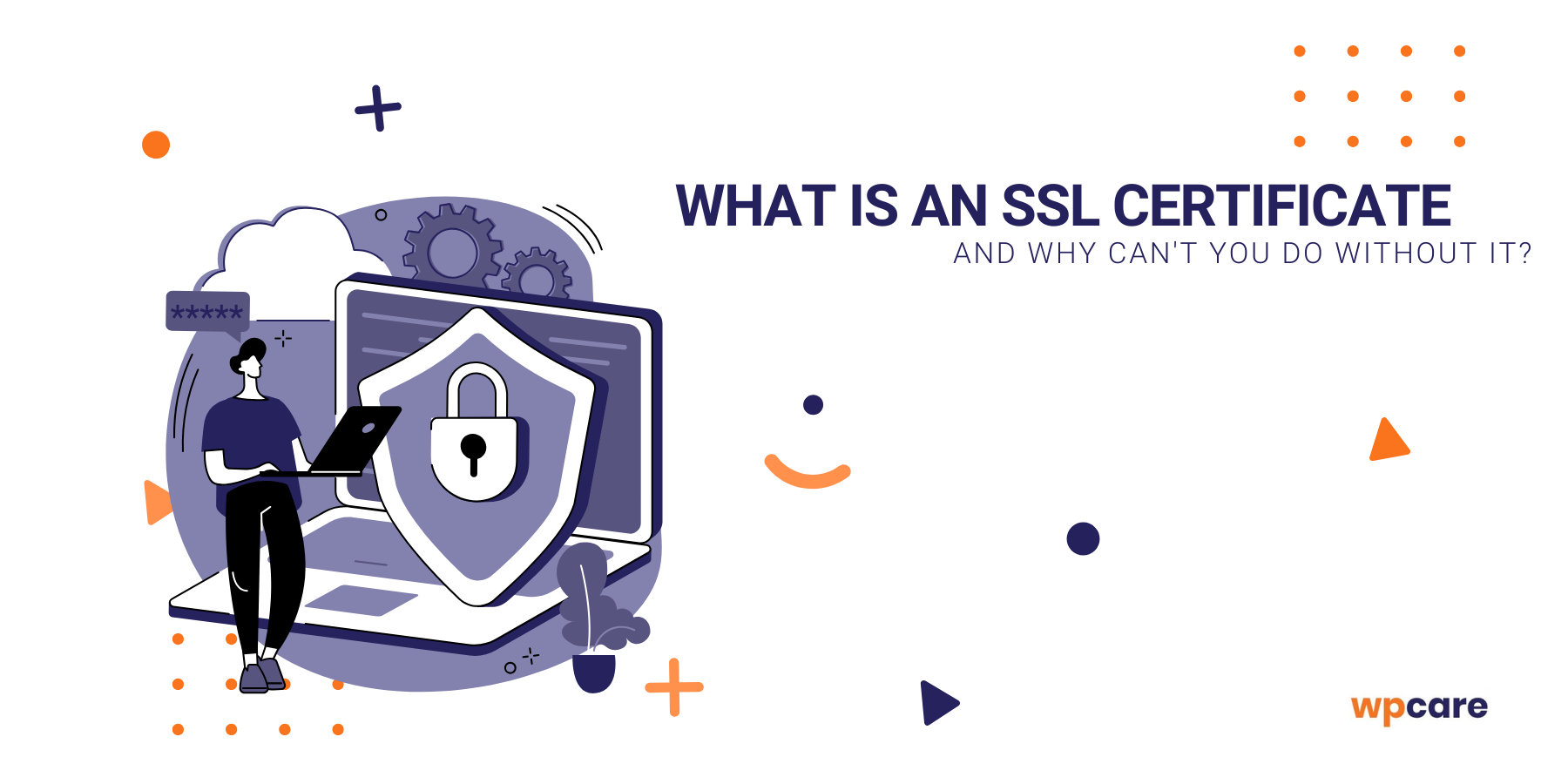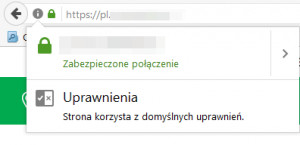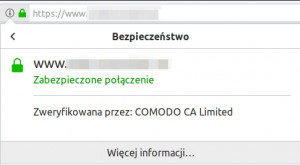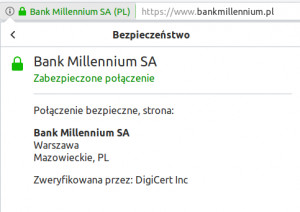It cannot be denied that the SSL certificate has become a standard in the online space. An increasing number of users and online content publishers realize that it is essential for the secure functioning of websites. The advancement of their capabilities has certainly contributed to the growth of this awareness. Today, it is online where we make purchases, transfer money, share personal data, and even settle accounts with the Tax Office. Without SSL, each of these activities would be a potential invitation for attacks and data theft. So, what is SSL? And who should consider implementing it?

What is an SSL certificate?
The abbreviation SSL stands for Secure Socket Layer. Both the name and the technology associated with it were developed by Netscape in 1994. Its versatility, high effectiveness, and relatively simple implementation have made it a widely accepted standard for encryption on websites. It secures the data stream that flows between the website user and its server. An SSL certificate guarantees that all the data you transmit (e.g., logins, passwords, card numbers) is secure and confidential.
How does SSL encryption work?
SSL can be used to encrypt various types of connections (e.g., FTP or email). However, it is most commonly used to secure the HTTP protocol. With SSL encryption, we obtain the HTTPS (HyperText Transfer Protocol Secure) protocol and the assurance that the data exchanged with the website does not fall into the wrong hands.
The general method of SSL operation on a website is based on encryption keys and an authentication certificate. In simple terms, it works as follows: each party—such as the user and the web server—possesses two encryption keys: a public key and a private key. When a user requests data from the website’s server, the server asks the browser for its public key. It then uses this key to encrypt the information needed by the user and sends it back to the browser. The browser, using its private key (which is not shared with anyone), decrypts the data and delivers it to the user.
When the user sends information to the server (e.g., via a form), the process is similar. In that case, the browser requests the server’s public key and encrypts the data, which is then decrypted by the server’s private key.
To further enhance security, a public key certificate—commonly known as an SSL certificate—was introduced. It is issued by an external, trusted provider (a certification authority) that confirms that the given server key truly belongs to the server.
When to use SSL?
Using SSL on a website is generally optional. However, it is worth remembering that especially now, after the implementation of GDPR, it is highly recommended for all sites processing various types of user data, particularly for:
- online stores,
- auction sites,
- school and university portals,
- corporate websites,
- government websites,
- websites dealing with patient health,
- payment processing sites (e.g., bank or financial institution websites),
- email services,
- client-server applications.
Although the regulations do not explicitly mandate the use of SSL, the imposed conditions can only be met with its help. According to GDPR, information (especially personal data) must be encrypted, and the chosen method must ensure the continuous confidentiality of systems and services. Neglecting this requirement may result in severe financial penalties. Therefore, if a website handles such information, encryption is essential.
Types of SSL certificates
SSL certificates can be divided into three groups, depending on the method of verifying the entity using them.
DV certificate – domain validation
This is the lowest level of authentication. When issuing a DV SSL certificate, it is verified that the applicant actually has the right to use the domain, but no additional data is checked.

Where does a DV certificate work best?
Remember that the less information a certificate contains, the lower the user’s trust in the website. This type of certificate is used less frequently nowadays, most commonly by personal websites or blogs.
OV certificate – organization validation
This type of certificate can only be obtained after verifying the right to use the domain and the data identifying the entity (individual or company) applying for the certificate. For this purpose, it is necessary to submit information such as a company registration number (KRS) to the certification authority, which verifies its accuracy. These details then become part of the certificate.

Where does an OV certificate work best?
This class of certificates is used in commercial and public projects, such as online stores or news websites.
EV certificate – extended validation
This is the most comprehensive method of verifying the entity and the website applying for the certificate. Before issuing the certificate, the applicant is thoroughly checked (including legal status, compliance with official documents, and actual business operations) as well as their right to use the domain. This certificate is easily distinguishable from the others, as the company’s details, which applied for the certificate, appear alongside the classic green padlock.

Where does an EV certificate work best?
Due to the detailed verification process, this type of certificate is most commonly used by banks, financial institutions, or some government websites.
Wildcard certificate
DV, OV, and EV certificates are issued for a single domain, without its subdomains. However, it is possible to extend protection by using a wildcard certificate, which allows the certification of all subdomains of a given domain.
Where does a wildcard certificate work best?
This option is ideal for entities that manage a larger number of subdomains within a domain. It is important to note that a wildcard certificate covers only first-level subdomains (e.g., sklep.wp-opieka.pl), meaning that second-level subdomains (e.g., hurt.sklep.wp-opieka.pl) will not be secured.
SSL certificate – why should you implement it on your website?
The main advantage of encryption is the security of user data. This alone should encourage website owners to implement SSL. For those who need further reasons, here are some additional arguments:
SSL facilitates SEO
Although many myths have grown around Google’s algorithms, SEO specialists are convinced that the HTTPS protocol is one of the many ranking factors. What does this mean? While encryption alone won’t guarantee you the top positions, it will undoubtedly make it easier to compete for them.
Data integrity and trustworthiness
Encryption and the use of external certificates ensure that the risk of intercepting data secured by SSL is negligible. Additionally, this solution eliminates the risk of compromising data integrity—i.e., making unauthorized changes by unapproved parties. It is therefore an excellent solution for entities that need to comply with legal requirements (including GDPR).
Protection against phishing
Phishing, which involves stealing data using a forged website, is one of the more common methods of theft online. Typically, the fake site differs from the original by subtle details, such as an extra letter in the URL. The one element that thieves cannot replicate is the SSL certificate.
SSL builds user trust
The SSL protocol underpins the credibility of a website and assures users that their data is secure. This increases their trust, builds a professional image, and boosts their willingness to interact with the site. Research indicates that installing an SSL certificate can reduce the website’s bounce rate and increase conversion rates by several dozen percent!
Encryption is becoming a requirement
An increasing number of independent organizations are insisting on the implementation of SSL. For example, Facebook requires an SSL certificate to launch and integrate an online store with your website. Similarly, WordPress favors hosting and sites that have SSL. Additionally, it is one of the criteria set by the Payment Card Industry Data Security Standard for websites. Without SSL, implementing such payment systems may be impossible.
SSL installation – common issues and mistakes during implementation
Experience shows that implementing encryption on a website can cause issues—especially for those who have not previously worked extensively with such technologies.
I installed the certificate, but the padlock is strikethrough
In this situation, the problem is usually that not all elements on the site (e.g., files, scripts) are being loaded over a secure (encrypted) connection, or the site is using files hosted on an external server that does not have SSL. To resolve the issue, check the file references and, if necessary, replace http:// with https://. If the problem lies with an external server, SSL should also be implemented on that server.
Lack of redirection
This is perhaps one of the most common mistakes made by those implementing SSL. It is important to remember that after installing SSL, there are two versions of your website—HTTP and HTTPS. For Google, these are treated as two different sites with duplicate content, which negatively affects search rankings. The only solution is to properly set up redirection between the two versions.
Outdated sitemap
It is often forgotten that after implementing SSL, you need to generate a new sitemap and submit it to Google Search Console. This operation helps search engine robots index the site, allowing you to see the desired effects sooner.
These are just some of the issues you might encounter when implementing SSL. Most stem from insufficient knowledge about the specific workings of websites and web servers. Although installing SSL on your own is possible, to avoid the consequences of improper implementation, it is advisable to leave the task to specialists. WP Care has many years of experience in implementing and configuring SSL certificates on various websites. This ensures that our clients can focus on growing their businesses without worrying about technical issues.
If you need SSL implementation on your website – trust the specialists. We offer not only WordPress-based website creation but also comprehensive technical support. As WP Care, we have many years of experience, which guarantees the high quality of our services.
Contact us, and we will surely help you!




















































